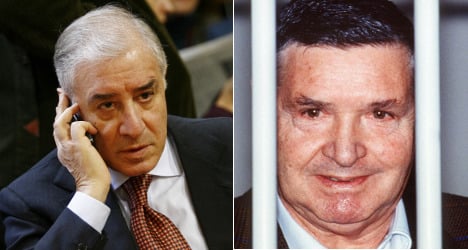Ten people including then interior minister Nicola Mancino and then mafia leader Toto Riina are on trial and prosecutors have called as witnesses top figures like President Giorgio Napolitano.
"I fought against the mafia. I cannot be in the same trial as mafia bosses," Mancino said before the start of the hearing, Italian media reported.
"We will ask for the trial to be scrapped," said Mancino, who is only charged with false testimony.
A few anti-mafia activists heckled Mancino as he came out of the courtroom after the hearing shouting "Shame!" and "Mafia out of the state!"
The hearing was immediately adjourned to Friday following a request by prosecutors and defence lawyers for more time to consider applications submitted for civil plaintiffs in the trial.
The far-left Rifondazione Comunista party is so far the only plaintiff. Party leader Paolo Ferrero told reporters he was taking part in the trial in honour of "all the people killed by the mafia".
Prosecutors allege that after the assassinations of a top anti-mafia judge in 1992, senior Italian officials engaged in secret talks with the mafia.
The accusation is that they agreed to be lenient, allowing for fewer trials and easier prison conditions, in exchange for an end to the attacks.
Mancino is being tried with ex-senator Marcello dell'Utri and three former top police officers: Antonio Subranni, Mario Mori and Giuseppe De Donno.
Former mafia bosses Riina, Leoluca Bagarella and Antonio Cina, as well as mafia turncoats Giovanni Brusca and Massimo Ciancimino, are also on trial.
As part of the investigation, prosecutors wiretapped a private conversation between Mancino and Napolitano, which created a stand-off between the prosecutor's office and the Italian presidency.
After a court ruling, the wiretap has been destroyed and its contents have not been revealed.
Collusion between Italian officials and the mafia has often been alleged but few cases have gone to trial and even fewer have resulted in convictions.



 Please whitelist us to continue reading.
Please whitelist us to continue reading.
Member comments